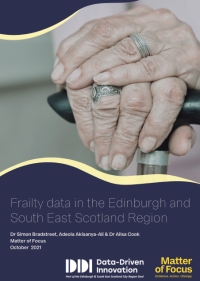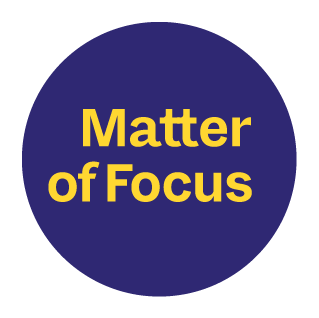Matter of Focus completed a review of data systems and current pathways in health and care systems related to frailty. The review was commissioned in 2021 by the Data Driven Innovation (DDI) Hub at the University of Edinburgh and explored the use of frailty data in the six Health and Social Care Partnerships (HSCPs) in the Edinburgh and South East Scotland region. This formed one part of their work to connect relevant data systems and we are now delighted to share the findings of the review more widely.
Background to the work
The identification and management of “frailty” was identified as an initial regional priority by the Health and Social Care element of the DDI Programme (HSC DDI) and its partners. Matter of Focus was asked to undertake a review of relevant electronic systems across a region which includes six Health and Social Care Partnerships (HSCPs): Edinburgh, East Lothian, West Lothian, Midlothian, Borders and Fife. We were asked to focus on the identification and management of people who may be frail and also arrangements for sharing data. Findings were intended to inform the structure of a future frailty data in DataLoch.
What we did
Central to our approach was a collective process of engagement of the six HSCPs and their representatives, building on our expertise of delivering collaborative improvement programmes. We also used our own outcome planning software, OutNav, to capture information during and between the workshop sessions with representatives of the HSCPs and to create an outcome map describing the current and potential use of frailty data. In addition, we surveyed HSCPs and gathered case study examples of current best practice.
What we found
An appetite for collaboration, consistency and improvement
Through our stakeholder engagement we found a high degree of enthusiasm for collaborative working in this area and a strong desire to share best practices and to increase consistency in systems.
Amazing to find out how many people are involved in frailty in various ways and to make those links/connections to share good practice and ideas.
Workshop participant
Linked with this desire for consistency, we uncovered a high degree of diversity in systems across the HSCPs as well as within them. For example, we were made aware of up to eight standard tools that had been used in the region for the assessment of frailty.
Factors helping and hindering effective use of data across the partnerships
By undertaking a context analysis we identified a broad set of factors which helped or hindered the more effective use of frailty data across the HSCPs. It was widely acknowledged that this is an especially complex domain of care where many statutory, voluntary and informal actors contribute to helping people manage frailty in all its forms. This makes data sharing and the analysis across disparate data sets more complex. As a result, partnership working and mutuality seem to be vital to building trust in relation to the better use of data.
Building on examples of good practice
By sharing examples of the successful use of frailty data across the region we were able to start the development of theory of change which articulated how improved use of frailty data could lead to improved outcomes for citizens and systems. This outcome map, developed through HSCP stakeholder engagement, offers an aspirational perspective on how things could be in relation to the use of frailty data. All of these steps and the resulting outcome map and pathways are described in more detail in the report.
The scene setting really helped to bring a large and diverse group together at the beginning. I learned (had it confirmed) that we are all dealing with frailty differently according to our organisational culture and the focus that we have been able to apply.
Workshop participant
Across our work at Matter of Focus we see often a lack of analytic capacity in hard pressed health and social care organisations, which was echoed here. There is a strong desire to make better use of data to improve systems and experiences but at the same time a concern around having the correct skills and capacity in place to do so. Despite this we report on strong examples of data being used to identify and stratify frailty at population level and to bring new insights about service delivery, personal outcomes and system efficiencies. Based on what we have seen, the potential to develop such approaches regionally (and more widely) is significant and is matched by a strong appetite for collaboration and shared learning. We hope to continue supporting collaboration and improvement in this vitally important aspect of the health and care system and I would be delighted to respond to enquiries or to hear your views on the report. Contact me at simon[at]matter-of-focus.com or via the contact us form.
Download the report

Frailty data in the Edinburgh and South East Scotland Region.
Produced by Matter of Focus for the Data Driven Innovation Programme (Health & Social Care)
Download pdf